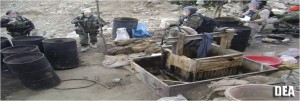The following excerpt is from a recent article by John Sullivan and Adam Elkus in Small Wars Journal:
“[They address] entities with substantial firepower, intelligence, and political clout. Reducing violence as a strategy in order to create a new equilibrium will not in itself resolve the basic political dispute between a state and substate actors looking to seize control or manipulate the state’s legitimate and illegitimate institutions… American involvement will not be ignored or regarded as neutral”
Does the quote narrow down the issue or geographic region they are focusing on? If you guessed Afghanistan, you are incorrect. Sullivan and Elkus are in fact addressing the deterioration of political legitimacy in Mexico through informal economic and political domination by drug cartels. However, if the excerpt from the article brought Afghanistan to mind, the overlapping framework is laid effectively. Though the political environments in Mexico and Afghanistan – and resulting American responses – differ significantly, there are some basic parallels U.S. policymakers should recognize. And perhaps the shortcomings of the Afghan occupation can offer some lessons for policy responses to narcotrafficking in our next-door neighbor, Mexico.
Afghanistan
The “kickoff” of an independent Afghan government largely responsible for establishing its internal security, rule-of-law, and legitimate political institutions will officially commence upon the withdrawal of US troops in 2014. For better or worse, it will be left to the Afghans themselves to sort out political and sectarian disagreements and establish a stable and enduring state. A major obstacle they face is the lack of lucrative economic activity to drive growth. In many regions, opium farming is the only realistic source of profit. Resultantly, a self-perpetuating political-economic cycle has developed between poppy producers and their Taliban guardians.
By capitalizing on the relatively static global demand for opium (Afghanistan produces roughly 90% of the world’s supply), the perpetuators of civil conflict find an enduring economic foundation in illicit drug trafficking. The opium-funded insurgency has proven particularly effective in adapting asymmetric tactics to counter American technological dominance. The opportunity for said operations to undermine the central government’s legitimacy is likely to only worsen without strong democratic institutions and social norms to prevent it.

DEA Special Agents & ISAF soldiers in action during 2010 Afghan heroin lab crackdown Operation Tarpit
Mexico
Though Mexico has an established federal government and a productive economy, severe challenges from nacrotrafficking organizations, especially against local and municipal governments in remote regions, have vastly undermined the rule-of-law. Critical attempts to label Mexico as a “failed state” are perhaps exaggerated rhetoric, but the prevalence of corruption and cartel influence through all levels of government are widely acknowledged.
As the vast majority of demand for Mexican-routed cocaine and marijuana is from the United States, U.S. policymakers have a direct, vested interest in the legitimacy of the Mexican government and its ability to combat narcotrafficking. The newly-elected Institutional Revolutionary Party (PRI) has thus far willingly cooperated with American anti-trafficking operations and pledged its commitment to take cartels seriously by establishing a paramilitary police force with greater capacity to combat well-armed traffickers.
The tools to address the drug trade are more readily available in Mexico than Afghanistan. Shared geography and mutual trade arrangements with the U.S. drive the necessity for a stable and legitimate Mexican state. The failed American effort to set up de facto governance and mitigate instability in Afghanistan sets a precedent that should avoided at all costs.


